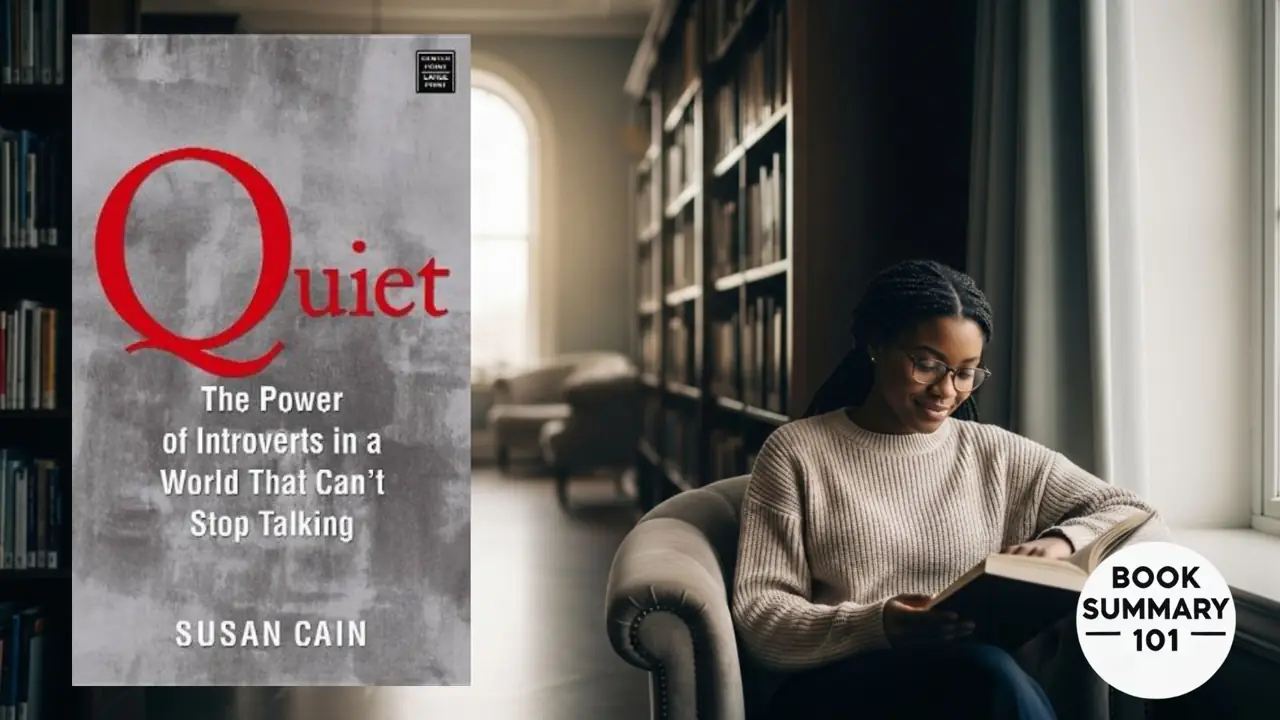In a world that constantly praises the loud, the bold, and the outgoing, Susan Cain’s Quiet: The Power of Introverts in a World That Can’t Stop Talking is a breath of fresh air. This book flips the script on what it means to be introverted, uncovering how the quiet strengths of introverts can be some of the most powerful forces in our society. Whether you’re an introvert yourself, trying to understand a loved one, or just curious about how the world could use a little less noise, Quiet is a game-changer.
Here’s why this book matters, who it’s for, and some real-life stories Cain uses that might just make you see introversion in a new light.
Why Read This Book?
Susan Cain makes a strong case that we live in a society that undervalues introverts—and that this is a mistake. From the classroom to the workplace, we’re often told that being extroverted is the way to get ahead. But Cain argues that this “Extrovert Ideal” overlooks the deep creativity, focus, and leadership that introverts can bring to the table.
If you’ve ever felt out of place in a crowded room or found yourself needing time alone to recharge, this book speaks directly to you. Cain isn’t saying one personality is better than the other, but that we all benefit from understanding the strengths of different personalities.
The Power of Introversion: Embracing Depth, Creativity, and Focus
One of the biggest strengths of Quiet is how Susan Cain breaks down the idea of introversion into something that goes far beyond shyness or quietness. Introverts, she explains, aren’t just people who prefer being alone; they’re individuals who bring a unique kind of depth to the table. Cain explores how introverts process information more deeply, value contemplation over quick responses, and, perhaps most importantly, thrive when they have the space to pursue ideas with focus and creativity.
Introverts are often underestimated, particularly in high-energy, competitive environments like business and politics, where boldness is rewarded. However, Cain dives into the science behind introversion, explaining that the difference between introverts and extroverts is not merely behavioral but rooted in biology. Introverts’ nervous systems tend to be more sensitive to stimuli, which is why they can feel overwhelmed in highly stimulating environments and prefer quieter settings to think deeply.
Cain makes a compelling case that society is missing out by not recognizing these qualities. In the workplace, for instance, the natural introvert strengths—such as listening, reflecting, and taking time to make well-considered decisions—can be incredibly valuable. Instead of asking introverts to constantly push beyond their comfort zones, Cain suggests creating spaces that allow them to work in ways that align with their strengths. This could mean more flexible work settings, fewer group brainstorming sessions, or even providing “quiet hours” where deep work can flourish without interruption. She argues that a better understanding and appreciation of introversion could lead to environments where people feel seen, valued, and encouraged to bring their best selves to the table.
Introverts also excel in areas that require patience, thoughtfulness, and creativity. Cain points out that introverts tend to be more comfortable with solitude, which gives them a natural advantage in tasks that require intense focus and creativity, like writing, inventing, or solving complex problems. She reveals that introverts often don’t see their unique advantages because they’re busy trying to live up to an extroverted ideal. By understanding their introverted nature and embracing it, people can not only reduce stress but also tap into their own hidden potential.
Real-Life Examples: Quiet Leaders and Deep Thinkers Who Changed the World
Susan Cain doesn’t just talk about introversion in theory—she brings it to life with examples of powerful introverts who changed the world in ways that might surprise you. These real-life stories drive home the message that introversion is not a barrier to success, but in many cases, a pathway to making a meaningful impact. Let’s dive into some of her most compelling examples.
Rosa Parks: The Quiet Spark of a Revolution
When most people think of civil rights activism, they imagine marches, speeches, and crowds chanting for change. But Rosa Parks, often called “the mother of the civil rights movement,” changed history with a simple, quiet act of resistance. In 1955, she refused to give up her seat on a Montgomery, Alabama bus—a decision that sparked the Montgomery Bus Boycott and ultimately led to significant changes in U.S. civil rights laws.
Rosa Parks wasn’t the kind of leader who rallied people with her words. Instead, she was a quiet, reflective person whose powerful conviction and quiet strength made a statement louder than words ever could. Cain explains that Parks’ introverted nature didn’t detract from her influence; rather, it amplified it. Her act of quiet defiance resonated with millions, proving that a calm, determined stance could inspire and move others to action. Cain uses Parks as a shining example of how introverts can be powerful leaders in their own way, showing that influence isn’t about volume but conviction.
Steve Wozniak: The Creative Genius Behind Apple’s Success
While Steve Jobs was the charismatic face of Apple, known for his big ideas and passionate presentations, Steve Wozniak was quietly working behind the scenes to turn those ideas into reality. An introvert by nature, Wozniak preferred working alone, spending countless hours in solitude developing the technology that would become Apple’s first computers. Cain highlights how Wozniak’s introversion was not a hindrance but a driving force behind his success. His ability to concentrate intensely on complex problems allowed him to develop groundbreaking designs that transformed the tech world.
Cain also emphasizes that without Wozniak’s deep-thinking personality and commitment to perfecting his craft, Apple may never have achieved the success it did. Wozniak didn’t need to be the face of the brand or the loudest voice in the room. Instead, his quiet persistence and passion for technology created a foundation upon which Jobs could build Apple’s global brand. Through Wozniak’s story, Cain illustrates how introverts bring a unique skill set to the table—one that often leads to innovation, creativity, and excellence.
Eleanor Roosevelt: An Advocate for Justice with a Quiet Voice
Eleanor Roosevelt, a First Lady and human rights advocate, was known for her compassion, strength, and influence, but she was also an introvert who preferred solitude to the spotlight. Cain dives into how Roosevelt’s quiet nature allowed her to listen, observe, and connect with people on a deep level, helping her champion causes that were close to her heart. She often shied away from public speaking and large gatherings, yet her influence and impact were profound. Roosevelt’s introversion allowed her to approach her work with a sensitivity and thoughtfulness that led to genuine, lasting changes.
Cain shares how Roosevelt’s calm and composed demeanor helped her become an effective diplomat and a tireless advocate for human rights, especially during her work with the United Nations after her husband’s death. Her introverted nature made her less concerned with external validation, allowing her to focus on her values and vision. Roosevelt is another powerful example in Cain’s book of how quiet, reflective individuals can lead and inspire without compromising who they are.
Why These Stories Matter
These stories are a reminder that introverts have a different way of making their mark on the world, one that doesn’t require them to change who they are or conform to extroverted ideals. By focusing on Rosa Parks, Steve Wozniak, and Eleanor Roosevelt, Cain illustrates that introverts can create lasting impact simply by staying true to their strengths. Each of these figures demonstrated that quiet power is still power—and that sometimes, the most significant contributions come from those who aren’t seeking attention.
Cain’s real-life examples make a compelling argument: society has long overlooked the potential of introverts, but we all stand to benefit by learning from their unique approach to leadership, creativity, and connection. In a world that often values quick wins and loud voices, these quiet leaders show us that lasting change is often built on patience, focus, and resilience.
Join the Conversation!
Quiet isn’t just a book; it’s an invitation to rethink what success looks like in a society that’s always on the go. Cain’s message is timely and empowering, especially for anyone who’s ever felt the pressure to “put themselves out there” when that didn’t feel natural. She reminds us that sometimes, slowing down and stepping back can lead to greater innovation, more meaningful connections, and a better understanding of ourselves.
This book also encourages extroverts to understand and appreciate the introverts in their lives, helping bridge communication gaps and create stronger, more balanced relationships. So whether you’re introverted, extroverted, or somewhere in between, Quiet has insights that can help you connect more deeply with the people around you—and yourself.
5 powerful quotes from Quiet: The Power of Introverts in a World That Can’t Stop Talking by Susan Cain
📖 1. “There’s zero correlation between being the best talker and having the best ideas.”
This quote hits at the heart of Cain’s argument: just because someone is outspoken doesn’t mean they’re the most insightful. In fact, quiet thinkers often have the deepest, most innovative ideas—they just don’t always shout them out loud.
📖 2. “Solitude is a catalyst for innovation.”
Cain makes a strong case that many of the world’s greatest ideas were born in quiet rooms, not loud meetings. This quote reminds us that stepping away from the noise can actually unlock our most creative selves.
📖 3. “Don’t think of introversion as something that needs to be cured.”
Too many people grow up believing there’s something wrong with being quiet. Cain flips that idea on its head, encouraging readers to stop trying to “fix” introversion and start honoring it as a strength.
📖 4. “Everyone shines, given the right lighting.”
This beautifully simple quote captures the importance of environment. Introverts don’t need to change who they are—they just need the right space to thrive. Cain argues for workplaces, schools, and relationships that embrace different energy styles.
📖 5. “The secret to life is to put yourself in the right lighting. For some, it’s a Broadway spotlight; for others, a lamplit desk.”
This quote ties it all together. Success doesn’t look the same for everyone. Some thrive on stage, others in solitude—and both are equally valid and valuable.



